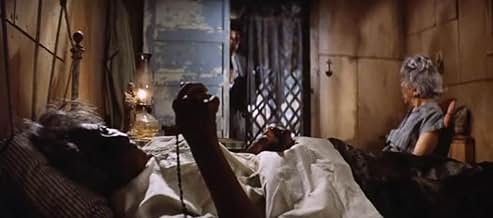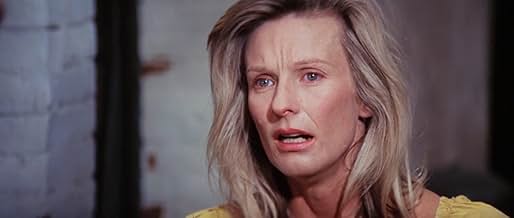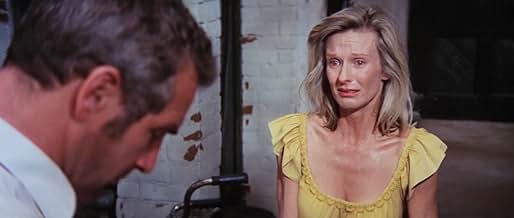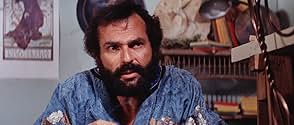IMDb RATING
5.5/10
1.5K
YOUR RATING
A radio station in the Deep South becomes the focal point of a right-wing conspiracy.A radio station in the Deep South becomes the focal point of a right-wing conspiracy.A radio station in the Deep South becomes the focal point of a right-wing conspiracy.
- Awards
- 2 nominations total
Featured reviews
I have to agree with those who praise this film and realize that its not everyone's cup of tea. Although I appreciate the criticisms that some reviewers have leveled, it is wise to keep in mind that it is unfair to criticize a film 30+ years after its release through a contemporary lens. The sense of humor that some have found "lacking" is something that develops with the objectivity of lapsed time. During the late 1960's, many of us found little humor in the assassinations and general insanity that seemed to fill the political landscape. Like the previous reviewer, I, too, have been looking for this film for years and hope to see it on DVD one day soon. I found it to be a powerful piece.
Whilst I would make it clear that I enjoyed much of this film, I would make it equally clear that I found a fair amount of it ill-developed and tediously clunky.
It is a ripe political melodrama, clearly borne out of passions and disappointments which arose from the particular year of 1968 and lingered long into the 1970s. I don't think I could make much argument with the previous commentator's view that the film is made from a certain left-liberal point of view. But a moderate left-liberal stance, and tacitly so. Despite saying that, Anthony Perkins' character - an embodiment in many ways of the "liberal" stereotype - is not made particularly sympathetic. Well-meaning, obsessive, anguished and humourless, I would agree with the Time Out reviewer that it was astute - if unimaginative - casting. Perkins comes across as if his Norman Bates persona has been relocated to late-sixties urban America and forcibly invested with a political conscience.
Paul Newman, who shares perhaps too few scenes with his nemesis Perkins, is also rather good, as the wanderer with a certain cocksure touch, who easily becomes an on-air "communicator" for this WUSA radio station - which is involved in fraudulent dealings and far-right preachings. Newman is every inch the tabloid professional; he is able to claim that he has no agenda and is 'just doing a job'. His political views are ambiguous; his final speech indeed suggesting he has no real belief in the "new right". It difficult to precisely gauge what makes the character tick, besides an vague cynicism; he is as flawed and formidable as Perkins, but diametrically opposite, with his rejection of abstract morality: his behaviour set on a course of mere self-aid. He proves to be the adept survivor, in contrast to genuine ideologues of left or right, but he has no moderation instinct, and turns out somewhat troubled, baffled even, at the film's appropriately frazzled conclusion.
Then there is Joanne Woodward; first film I have seen her in, and one of I gather, many, with Newman. Her character is a trifle ineffectual, present, as if a chess piece, to engage the elusive Reinhardt's desires for a period, and to provide a more 'ordinary' site of audience identification, who does not have right or left-wing politics, and does have more endearing traits: at least compared with Reinhardt. Woodward is quite memorable, cutting a wilting, waning figure as this unfortunate woman, herself much as transitory as Newman at the film's beginning. If she convinces as a 'realistic' character, it is albeit as one implicitly used to condemn the excesses of the New Right and the confrontational politics of the time. Her sickly teariness near the close, and the fact of her being the only person in the riotous hall to listen to Newman's absurdest "we're o.k.!" irony, suggests an idealised 'ordinary person' wrapped up in harmful political events. This is all rather undignified and melodramatic to stand for one who is expected to take this overwrought stuff seriously, and merely serves to draw out some of Reinhardt's humanity for the ending.
Newman does invest Reinhardt with a portion of his customary charm, but this is largely and effectively shown to be a front. Woodward is taken in, like the general audience as it were, by this superficial charm, and she ends up broken both by Newman's inconsistent, careless attitude and by the rupturing of the society depicted.
The film does not go far enough with many of its themes, and I did expect rather more in the dramatic and comic departments - if melodrama is going to work it needs either grand force or a bathetic line in absurdity. The whole lacks humour: born of a self-consciously 'serious' grounding in the subjectivity of U.S. politics in the late-sixties era. On this point, note that Laurence Harvey is vastly under-used; and he of that deeply substantial and bizarre masterpiece of a political thriller, "The Manchurian Candidate"... And additionally, we never see enough of Newman's dealings and relationships with his Rightist colleagues - similarly to how we never see Perkins in the broader context of Left politics. Loose ends were certainly left untied as regards Perkins' character.
I did on the whole quite enjoy this, but it was not a particularly entertaining film: variable in its plotting, dialogue and tone. A case of potential untapped? Undoubtedly. But it is worth paying close attention to those central performances, and it is at least part of its era's Hollywood; markedly less 'safe' and conformist then than now.
It is a ripe political melodrama, clearly borne out of passions and disappointments which arose from the particular year of 1968 and lingered long into the 1970s. I don't think I could make much argument with the previous commentator's view that the film is made from a certain left-liberal point of view. But a moderate left-liberal stance, and tacitly so. Despite saying that, Anthony Perkins' character - an embodiment in many ways of the "liberal" stereotype - is not made particularly sympathetic. Well-meaning, obsessive, anguished and humourless, I would agree with the Time Out reviewer that it was astute - if unimaginative - casting. Perkins comes across as if his Norman Bates persona has been relocated to late-sixties urban America and forcibly invested with a political conscience.
Paul Newman, who shares perhaps too few scenes with his nemesis Perkins, is also rather good, as the wanderer with a certain cocksure touch, who easily becomes an on-air "communicator" for this WUSA radio station - which is involved in fraudulent dealings and far-right preachings. Newman is every inch the tabloid professional; he is able to claim that he has no agenda and is 'just doing a job'. His political views are ambiguous; his final speech indeed suggesting he has no real belief in the "new right". It difficult to precisely gauge what makes the character tick, besides an vague cynicism; he is as flawed and formidable as Perkins, but diametrically opposite, with his rejection of abstract morality: his behaviour set on a course of mere self-aid. He proves to be the adept survivor, in contrast to genuine ideologues of left or right, but he has no moderation instinct, and turns out somewhat troubled, baffled even, at the film's appropriately frazzled conclusion.
Then there is Joanne Woodward; first film I have seen her in, and one of I gather, many, with Newman. Her character is a trifle ineffectual, present, as if a chess piece, to engage the elusive Reinhardt's desires for a period, and to provide a more 'ordinary' site of audience identification, who does not have right or left-wing politics, and does have more endearing traits: at least compared with Reinhardt. Woodward is quite memorable, cutting a wilting, waning figure as this unfortunate woman, herself much as transitory as Newman at the film's beginning. If she convinces as a 'realistic' character, it is albeit as one implicitly used to condemn the excesses of the New Right and the confrontational politics of the time. Her sickly teariness near the close, and the fact of her being the only person in the riotous hall to listen to Newman's absurdest "we're o.k.!" irony, suggests an idealised 'ordinary person' wrapped up in harmful political events. This is all rather undignified and melodramatic to stand for one who is expected to take this overwrought stuff seriously, and merely serves to draw out some of Reinhardt's humanity for the ending.
Newman does invest Reinhardt with a portion of his customary charm, but this is largely and effectively shown to be a front. Woodward is taken in, like the general audience as it were, by this superficial charm, and she ends up broken both by Newman's inconsistent, careless attitude and by the rupturing of the society depicted.
The film does not go far enough with many of its themes, and I did expect rather more in the dramatic and comic departments - if melodrama is going to work it needs either grand force or a bathetic line in absurdity. The whole lacks humour: born of a self-consciously 'serious' grounding in the subjectivity of U.S. politics in the late-sixties era. On this point, note that Laurence Harvey is vastly under-used; and he of that deeply substantial and bizarre masterpiece of a political thriller, "The Manchurian Candidate"... And additionally, we never see enough of Newman's dealings and relationships with his Rightist colleagues - similarly to how we never see Perkins in the broader context of Left politics. Loose ends were certainly left untied as regards Perkins' character.
I did on the whole quite enjoy this, but it was not a particularly entertaining film: variable in its plotting, dialogue and tone. A case of potential untapped? Undoubtedly. But it is worth paying close attention to those central performances, and it is at least part of its era's Hollywood; markedly less 'safe' and conformist then than now.
To me, the best part of this movie was the expression in Paul Newman's eyes every time he looked at his on screen sweetie pie, real-life wife Joanne Woodward. Every time he looked at her, his eyes lit up like fireflies, even when they weren't supposed to. In WUSA, the seventh of ten films they starred in together, Paul plays a weary radio announcer who cares more about surviving than doing the right thing, and Joanne plays a hooker with a disfigured face. In other words: two lost souls find love.
The movie could have centered on that tagline, but the romance is actually a small part of the plot. It's a very upsetting, depressive film with the popular 1970s theme of "people are mean, life is terrible". If you like movies like that, ie Network, The Parallax View, Three Days of the Condor, or even The Manchurian Candidate, this one will be right up your alley. I don't happen to like this genre, so I didn't end up liking it. It's a drama that shows the advantage people take whenever they can, even when it harms others. When someone tries to interfere for good, they get punished and pushed back down to their place. I won't spoil any plot points, but I'll just stress once again the heaviness of this movie. Don't watch it for the on (and off) screen couple. And for heaven's sake, don't watch it for Laurence Harvey; whoever told him to grow a beard for this movie needs to get his head examined. Watch it if you're the type of person who'll root for Anthony Perkins, the innocent lackey who decides to stand up for justice. Watch it if you think the world is a rotten place and you want a film to agree with you.
DLM Warning: If you suffer from vertigo or dizzy spells, there are a few random canted angles (the camera frames a shot tilted for no reason) that might not be your friend. Just be on the ready, or in other words, "Don't Look, Mom!"
The movie could have centered on that tagline, but the romance is actually a small part of the plot. It's a very upsetting, depressive film with the popular 1970s theme of "people are mean, life is terrible". If you like movies like that, ie Network, The Parallax View, Three Days of the Condor, or even The Manchurian Candidate, this one will be right up your alley. I don't happen to like this genre, so I didn't end up liking it. It's a drama that shows the advantage people take whenever they can, even when it harms others. When someone tries to interfere for good, they get punished and pushed back down to their place. I won't spoil any plot points, but I'll just stress once again the heaviness of this movie. Don't watch it for the on (and off) screen couple. And for heaven's sake, don't watch it for Laurence Harvey; whoever told him to grow a beard for this movie needs to get his head examined. Watch it if you're the type of person who'll root for Anthony Perkins, the innocent lackey who decides to stand up for justice. Watch it if you think the world is a rotten place and you want a film to agree with you.
DLM Warning: If you suffer from vertigo or dizzy spells, there are a few random canted angles (the camera frames a shot tilted for no reason) that might not be your friend. Just be on the ready, or in other words, "Don't Look, Mom!"
A lot of what was predicted in the film Network about the media was also put forth in this film about radio WUSA. Sad to say it was laid on a bit too thick by its players and director.
Paul Newman who had a lot of faith in this project plays an itinerant disc jockey who both gets a job at this New Orleans based radio station WUSA and takes up with hooker Joanne Woodward, a girl whose heart really isn't in her work anyway.
As station owner Pat Hingle says, "this is a station with a point of view" and Hingle expects that point to be emphasized at all times. At that time the Richard Nixon White House was big on telling us that they were looking toward the great 'silent majority' of Americans who took the 'my country right or wrong' dictum to the exponential height. That's WUSA's point of view.
Newman is not a terribly sympathetic figure here which is one of the reasons the film flattens out. He sees what's wrong, but just goes with the flow. A whole lot like the characters with one exception in that other Louisiana based political drama, All The King's Men.
One who doesn't is Anthony Perkins who plays this rather pitiable 'survey taker' whose job is really to foster racial discontent by getting minorities thrown off welfare. I imagine there were many a Perkins out there, but this one doesn't like being taken for a fool and he reacts most violently. Perkins is probably the character you most remember from WUSA.
WUSA correctly predicted the advent of right wing talk radio about fifteen years before it became a fact. Rush Limbaugh would have been right at home on Pat Hingle's station. They've even got a right wing political preacher played by Laurence Harvey as part of their family. Harvey's another interesting character, but he's also laid on a bit thick for my taste. He should have adapted a more subtle approach to the part.
I wish I could rate such a prescient film as WUSA a bit higher, but the heavy handed approach just gets in the way.
Paul Newman who had a lot of faith in this project plays an itinerant disc jockey who both gets a job at this New Orleans based radio station WUSA and takes up with hooker Joanne Woodward, a girl whose heart really isn't in her work anyway.
As station owner Pat Hingle says, "this is a station with a point of view" and Hingle expects that point to be emphasized at all times. At that time the Richard Nixon White House was big on telling us that they were looking toward the great 'silent majority' of Americans who took the 'my country right or wrong' dictum to the exponential height. That's WUSA's point of view.
Newman is not a terribly sympathetic figure here which is one of the reasons the film flattens out. He sees what's wrong, but just goes with the flow. A whole lot like the characters with one exception in that other Louisiana based political drama, All The King's Men.
One who doesn't is Anthony Perkins who plays this rather pitiable 'survey taker' whose job is really to foster racial discontent by getting minorities thrown off welfare. I imagine there were many a Perkins out there, but this one doesn't like being taken for a fool and he reacts most violently. Perkins is probably the character you most remember from WUSA.
WUSA correctly predicted the advent of right wing talk radio about fifteen years before it became a fact. Rush Limbaugh would have been right at home on Pat Hingle's station. They've even got a right wing political preacher played by Laurence Harvey as part of their family. Harvey's another interesting character, but he's also laid on a bit thick for my taste. He should have adapted a more subtle approach to the part.
I wish I could rate such a prescient film as WUSA a bit higher, but the heavy handed approach just gets in the way.
"WUSA" was a box office failure when it was released to theaters, was not resurrected that much on television, and it never got a home video release until recently. Seeing it, I think I can understand why there aren't that many people supporting the movie over the years. One big mistake the movie makes is with the radio station itself. It's supposed to be an influential and controversial radio station, but the movie seems very shy in showing it to us. It takes over a half hour from the beginning for Newman to start working for the radio station, and not once during the almost two hour running time do we actually get to HEAR the broadcasts that have both attracted an audience as well as people condemning it. The acting (particularly by Perkins) is good, and the movie is refreshingly downbeat, but overall I would only recommend the movie to those few viewers who are attracted to 1970s film cynicism - and even they might have issues with the movie.
Did you know
- TriviaPaul Newman researched the role by spending time at radio station KMPC in Los Angeles. The teen intern assigned to show him the operation was Ken Levine, who became a disc jockey before going on to be a writer on Cheers (1982), Frasier (1993) and M*A*S*H (1972), and a producer and director of other TV shows. He win an Emmy in 1983 for Cin Cin for "Outstanding Comedy Series".
- Quotes
Rheinhardt: I'm a survivor. Ain't that great?
- Alternate versionsThe preview version ran 3hrs and 10 minutes according to cast member Robert Quarry. Much of his character and several other characters' motivation and dramatic development scenes were cut out before release.
- ConnectionsReferenced in The Zodiac Killer (1971)
- SoundtracksGlory Road
Composed and Performed by Neil Diamond
- How long is WUSA?Powered by Alexa
Details
Box office
- Budget
- $4,800,000 (estimated)
Contribute to this page
Suggest an edit or add missing content







































